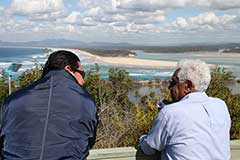Principle 6:
Consultation, negotiation and free, prior and informed consent are the foundations for research with or about Indigenous peoples.
Researchers should understand the meanings of free, prior and informed consent (FPIC), and the steps that must be taken to ensure that the process is followed properly.
Free, prior and informed consent means that agreement must be obtained free of duress or pressure, and ensuring that Indigenous people are fully cognisant of the details and risks of the proposed research. Informed consent of people as a group, as well as individuals within that group, is important.
Applying the principle
Conduct all research on the basis of free, prior and informed consent.
Ensure that Indigenous people are equal participants in the research process.
Ensure appropriate negotiation and consultation about the aims and objectives, and to ensure meaningful negotiation of processes, outcomes and involvement.
Ensure the research project has FPIC informed consent and plain English statement signed by participants.
Identify appropriate individuals and communities to consult - there is almost always someone to speak for a particular place or area.
For more general research, identify and consult individuals or communities who have made an important contribution in relation to the research topic.
Allow appropriate individuals for the area/topic to be identified from within the community.
Involve the Traditional Owners who speak for the Country.
Identify Indigenous regional, local and community and/or other organisations.
Identify any written research protocols or other protocols that need to be followed.
Observe appropriate community values, norms and protocols.
Identify potential political issues that may be affected by the research or the outcomes of the research.
Communicate with relevant individuals and organisations by appropriate means (face-to-face meetings are always desirable), and consider the budgetary and funding implications of such visits for the individuals and organisations.
In introductions to individuals and communities, clearly identify the researchers and any other participants, any institutional affiliations and key stakeholders, and sources of financial support.
Clarify objectives from the outset, but maintain flexibility and a willingness to modify goals and ways of working.
Agree about the involvement of individuals in the interpretation of the results and the preparation of any publications (including whether they should be co-authors).
Agree about identification or otherwise of individuals involved in the research, and whether those who take part in research should be acknowledged in any publication.
Principle 7:
Responsibility for consultation and negotiation is ongoing.
Consultation and negotiation is a continuous two-way process. Ongoing consultation is necessary to ensure free, prior and informed consent for the proposed research, and to maintain that consent.
Community representatives, individual participants including Traditional Owners, and the wider Indigenous community may need time to consider a proposed research project and to discuss its implications, both before it begins and at various stages of the project. Research projects should be staged to allow continuing opportunities for consideration of the research by the community.
Applying the principle
Phase research according to community as well as research needs.
Hold preliminary meetings to discuss the proposed research and reach agreements.
If necessary, reformulate the outline of the research proposal and provide new materials generated from the discussions to the community for review.
Ensure that all potentially interested individuals are present at preliminary meetings and/or are informed of the scope of the proposed research.
Explain research methods and processes to individuals, and at community meetings where appropriate, and reach agreement on their cultural appropriateness.
Rights to record and/or film require clearance from participating interviewees/subjects.
Negotiate agreement in relation to the rights and responsibilities in ownership of, and access to, recordings of Indigenous performances and activities, especially where those recordings are likely to be distributed and shared in ways such as digital audio and visual methods, DVD and the Internet.
Report during the project in accordance with any agreement.
If necessary, consult further about unforeseen matters that might affect the research process.
Be willing to renegotiate objectives in light of new factors and considerations and to modify the scope, aims and methods of the proposed research.
Allow time in the research project for continual review, feedback and discussion.
Ensure that Indigenous people have the right to decline or withdraw their involvement in a research project at any stage. Agree what will happen to material provided to the researchers, where the person who provided that material withdraws from the project.
Make provision for a final meeting to consider the results of the research. Further consultation may also be required about details of reports and any publications.
Obtain (do not assume) invitations to visit the community for the time necessary to conduct the research and to report upon results.
Principle 8:
Consultation and negotiation should achieve mutual understanding about the proposed research.
Consultation involves an honest exchange of information about aims, methods and potential outcomes (for all parties). Consultation is not merely an opportunity for researchers to tell the community what they, the researchers, may want.
Being properly and fully informed about the aims and methods of a research project, and its implications and potential outcomes, allows Indigenous people to decide for themselves whether to oppose or embrace the project.
Applying the principle
Identify appropriate Indigenous communities and individuals to consult before discussing research aims, methods and outcomes.
Clearly define and explain the purpose and nature of the study, who is carrying it out and funding it, the objectives of the research, and the likely impacts and consequences of the study, including production of research outputs, publication and commercialisation.
Explain methods of collecting information clearly and comprehensively, including how and where the information is to be kept.
Reach agreement on how the research should proceed, including processes and timing for informing representatives of the community of the progress of the research and reporting any interim results.
To conduct research appropriately and sensitively, discuss relevant cultural and political circumstances.
Be clear about the community or individual participation sought and what it may entail.
Provide an honest assessment of the risks or potential adverse impacts of the research.
Develop strategies to handle disputes that may arise. These may include mediation and other approaches where, for example, participants withdraw from a project, or the nature of the project changes after commencement.
Provide any environmental and social/cultural impact assessment studies and their outcomes as they impact on the research.
Provide examples of other research done by the people/groups seeking access, and discuss how the projects went and any problems that were encountered and how they were addressed.
Explain, but do not overstate, the potential benefits of the study.
Explain the potential usefulness of the research to Indigenous peoples in general.
Provide sufficient time for discussion and consideration of proposals.
Where a research project will result in joint authorship of a publication (where the contribution is significant), negotiate for shared copyright if appropriate.
Principle 9:
Negotiation should result in a formal agreement for the conduct of a research project.
The aim of the negotiation process is to come to a clear understanding that results in a formal, negotiated agreement (preferably written) about research intentions, methods and potential results.
Good faith negotiations involve a full and frank disclosure of all available information and are entered into with an honest view to reaching an agreement. In designing and commencing a research project, all participants should negotiate and reach agreement on a process for managing the Indigenous traditional knowledge and intellectual property that exists prior to commencement, how this relates to all those components of Indigenous traditional knowledge, cultural expression and intellectual property that result from the research and throughout the project, and the potential implications for all these components in research products and outcomes.
To protect the community and the researcher, and to clarify the understandings that have been reached, a written agreement (a protocol, memorandum of understanding or contract), where practical, should be the end result of the consultation and negotiation. Such agreements may have legal implications.
Applying the principle
Get a letter of support for the research project.
Identify who should enter into the agreement, and on whose behalf the agreement is made.
Base the agreement on good faith negotiations and free, prior and informed consent.
Consider whether independent legal advice is required.
Consider any permits or permissions that may be required from Indigenous organisations and from state, territory or local authorities.
Determine the information to be included in the agreement, based on discussions andnegotiations; the agreement should reflect the mutually agreed aims, processes and outcomes, community participation and collaboration.
In the agreement:
- provide a detailed and clear description of the ownership and licensing of intellectual
property rights;
- include the joint ownership or allocation of the results of the project;
- where possible, take into account the research needs of the local Indigenous people
and the appropriate Traditional Owners;
- recognise that an individual or a community has the right to withdraw from a
research project;
- include processes for resolving conflict, such as mediation by an outside party;
- refer to specific Indigenous community protocols and ensure that these are respected
and upheld; and
- include negotiated arrangements for benefits to be made to Indigenous people.




